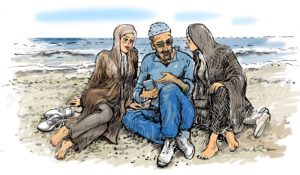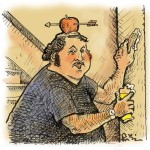
At dawn he’d set Klara and Stella to sifting through yesterday’s rubble. An hour later they came to him with an almost pristine Samsung Note 7 with no char marks; others might have tossed it out as just another iPhone. He rewarded them by telling them to take the rest of the day off on the beach, half hoping that he’d manage to slip away there himself to watch them gambol in the waves. Instead, here he was standing on the edge of Pit 3b watching Jawad, the grad student from the co-sponsoring University of Qom, brushing grit off a flat plastic torus. Jawad put his mouth close to the object to blow some dust off and grimaced.
“It’s still dirty,” Yehuda said. He considered leaping agilely into the pit as if he were Jawad’s age, but then figured it was not worth it since Klara and Stella were not watching, and he’d probably fall on his face anyway. They did seem to sit up and notice, though, when Jawad eschewed the ladder and jumped.
“That’s not dirt,” Jawad said, wiping the back of his hand on his beard. “It’s real shit.”
Yehuda fell silent.
“A clincher for your theory?” Jawad held the toilet seat up as if it were a trophy. “This is the Sha’ar Hagai gas station? Identified in that dog-eared family chronicle you lug around as having had the filthiest bathroom between Jerusalem and Tel Aviv?”
Yehuda felt tears come to his eyes, but he didn’t want Jawad to see them. When Miriam left him, he had become, officially, the last Jew remaining in what had, half a millennium ago, been the Jewish state. There were rumors of clandestine yeshivot and kibbutzim, but who knows whether the stories weren’t just the products of the Islamic Republic’s conspiracy-obsessed propaganda machine. He turned westward, to the girls.
Jawad ascended the ladder with his find in his left hand, and his right was soon extended toward Yehuda, who took it limply.
“Bab al-Wad? Is it for real?” Jawad looked around. “I mean, I respect a man in your position for standing up what he believes in. You go with the evidence. So this is where the Jewish terrorists began their bloody ascent to Jerusalem, slaughtering the people of Allah along the way, aiming to break the defense of al-Quds.”
Yehuda gazed west, toward the hills on either side of the wadi that led to the holy city, their date palms waving in the hot summer breeze. “You mean the siege,” he said sharply. Then he looked east, beyond the girls, to the horizon. It was there, under the water, just a few tens of kilometers from where he stood. Tel Aviv, the city where his ancestors, fleeing the Trump Protectorate, had settled centuries ago.
“Of course, Ayatollah Bijan won’t like it,” Jawad said breezily. “Given that it’s long been official policy of the Caliphate and our faith-bound historians that the Zionist entity was no more than a brief setback in Islam’s glorious march to victory. Aside from a few heaps of refuse and burned-out armored cars, the Jews left nothing behind.”
“Why don’t you just run and snitch to Ayatollah Bibi right now?” Yehuda glowered. “Be my guest. Take the rest of the day off. I’ll get more done without my minder at my elbow.”
“I’ll just take this over to the tent so it can be logged in,” Jawad said. He started off and then turned around. “If I were you, I’d start thinking about an alternative interpretation.”
Why, on the verge of the archaeological equivalent of victory, did Yehuda feel like the fight had gone out of him? He knew the answer. No one would believe him anyway, and worse than that he’d lose his job. Miriam, so long the lonely voice on and at his side, had despaired. He looked down into the pit and then said loudly, to no one in particular: “To hell with it.” Shouldering his knapsack, he set off for the beach. Maybe the girls had dared to take off their chadors.
They hadn’t been that brave. But, since they were soaked the formerly loose garments now clung to their figures like lamination.
“Yehuda!” They called out. “Come on in!”
He waved, shook his head, and sat down on the blanket they’d spread out just above the high tide line. A few minutes later they came out of the water and to sit with him, one on either side.
“Thanks so much for giving us the time off,” Stella said. She gave him a wet hug. “It’s so fun that there’s a beach you don’t have to climb way up to.”
“But why is he so sad?” Klara asked her friend. “Yehuda, why are you so sad on such a wonderful day? Don’t you like our cell phone?”
“I find it hard to believe that people used to have to actually hold their phones,” Stella said. At the slightest twitch of her lips, her own Multi-Vector Communications Module wafted out of her knapsack and floated up before her face. “It’s almost eleven,” she said. “I suppose you want us to come back.” She and Klara started getting up.
“In a minute,” Yehuda said. He opened his knapsack and drew out the tattered facsimile he always carried with him, the journal his ancestors had kept—on paper, so rare for that time but with such foresight! First I want to tell you a story.”
The girls settled back onto the blanket.
“Look out to sea. Way out. About fifty kilometers.”
The girls, suddenly serious, followed his gaze.
“There used to be a Jewish city there.”
“A whole city of Jews?” Klara marveled. “Under the water?”
“It was on the seashore. The seashore where it was then, before the seas rose.”
“They didn’t build a wall?” Stella was aghast. Stockholm, after all, had been saved by a dike 250 meters high.
“Not just a whole city of Jews. A whole country of them.”
Klara was not buying it. “But Jews are supposed to be smart.”
“That’s not so smart.”
“They weren’t so smart, these ancestors of mine. But I guess young people your age don’t learn ancient history anymore. See, once America was a great power.”
The girls giggled.
“Anyway, this guy named Trump took over there and canceled all the climate treaties and broke the economy building up a nuclear arsenal and selling off the best parts to his cronies. A lot of Jews fled here, because this place was supposed to be the refuge for oppressed Jews. But the government of the Jewish state was in cahoots with Trump, and built a bunch of settlements in Syria, which they claimed was part of the ancient Jewish homeland. In the end, they had a huge country with a vast Muslim majority and …”
Yehuda looked around and decided to play it safe, because who knows if these two blondes in chadors weren’t in the pay of the Shabam. “The Muslims, may Allah magnify and protect them, won and set up God’s kingdom on earth. The few Jews who survived became a tiny ethnic minority in what had been their own country.”
He’d said far too much.
He held up the facsimile. “That’s what it says here.” The girls looked confused. “But it’s a forgery. That’s what I’m out to prove. Let’s go back to camp.”
Of course, the Revolutionary Guards were already there and the whole excavation crew was buzzing around the toilet seat like a pack of flies. Jawad pointed at the new arrivals and an officer with lots of stripes on his shoulders motioned to Yehuda to come over. Yehuda shrugged and led the girls over to 3b and motioned them to follow him down the ladder. But they were too scared and stayed up top.
Yehuda knelt down at the spot where the toilet seat had been found and called out to Jawad: “Tell the captain or major or whatever he is that I want to show him what we’ve found.”
Yehuda heard voices, an argument, an attempt to persuade. Then Jawad coming down the ladder, followed by the officer and three bodyguards.
Yehuda looked up at the cloudless sky for a few moments. “Yes. So, what you see here—it’s puzzling, but I think I know what it is.”
The officer frowned.
“You see, the Jews, five hundred years ago, when they were not under the rule of a great imam, believed that certain electronic devices contained the word of God.” He called out to the girls above. “Klara, Stella, could you bring the Galaxy?”
The girls passed it down to Jawad, who gave it to Yehuda.
“You see, um, the Jews, they would drive here in their automobiles, to this site at the foot of the mountains, on their Sabbath day, and they would place it—Stella, Klara, the toil—I mean, the torus, please?”
The toilet seat was soon in his hands. He placed it back where Jawad had uncovered it and then placed the Galaxy in its center.
“They would place it in the center of this magic circle, which they would smear with human excrement and, after calling on their God to bless the coming week, they would cast a burning brand on it and call on their God to savor its aroma. Which is why when you find devices like this in digs they are always burned. We are all excited here because we found one the Jews didn’t manage to sacrifice.”
The officer harrumphed. “So you’re saying this dig has nothing to do with there being a Jewish city under the sea,” he said.
“Oh, of course not!” Yehuda tried his best to look the officer straight in the eye, but he couldn’t quite. “Who would believe a thing like that?”
The officer nodded at Jawad.
“I imagine that Ayatollah Bijan will be most interested,” he said. “And will want to turn this site quickly into a spot where good Muslims may come to see the benighted customs of the colonialist usurpers of olden times. So this probably will be your final season.”
“Yes,” said Yehuda. “I realize that.” He looked up at the two girls, who were peering down at him. “It has been fun, though, digging by the sea.”
^^^^^^^^^^^^^^^^^^^^^^^^^^^^^^^^^^^^^^^
 Read more Necessary Stories!
Read more Necessary Stories!
Receive email alerts of new Necessary Stories every month, and other pieces by Haim:
.





